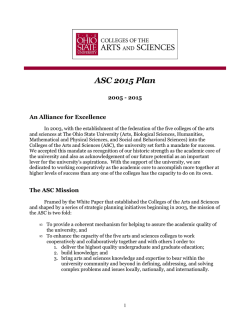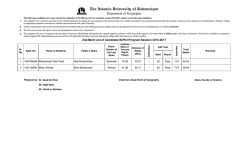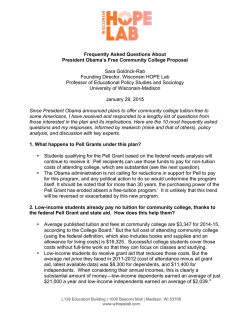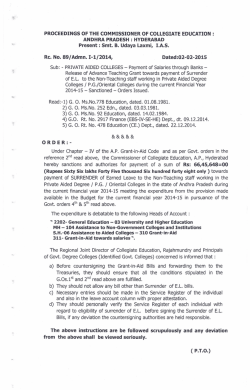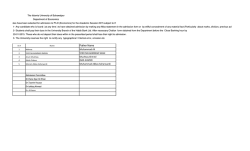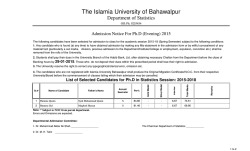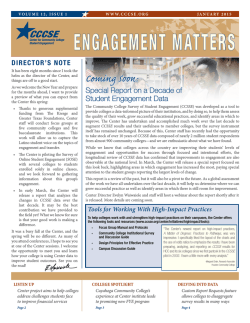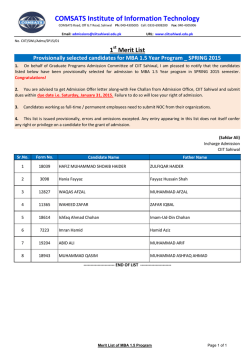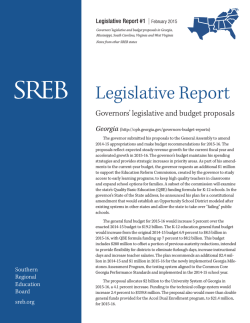
College 12th Grade Checklist
Summer Before 12th Grade ( ) Narrow down the list of colleges you are considering attending. If you can, visit the schools that interest you. ( ) Contact colleges to request information and applications for admission. Ask about financial aid, admission requirements, and deadlines. ( ) Decide whether you are going to apply under a particular college’s early decision or early action program. Be sure to learn about the program deadlines and requirements. ( ) Use the FAFSA4caster financial aid estimator one last time at www.fafsa4caster.ed.gov, and compare the results to the actual costs at the colleges to which you will apply. To supplement any aid FAFSA4caster estimates you might receive, be sure to apply for scholarships. Your goal is to minimize the amount of loan funds you borrow. TO EXPLORE: ( ) Find out what government financial aid you can apply for, and how, in Do You Need Money for College? at StudentAid.gov/needmoney. ( ) Watch the “Overview of the Financial Aid Process” video at www.YouTube.com/FederalStudentAid to learn about getting student aid from the government. ( ) Be careful when searching for scholarships: Read “Don’t Get Scammed on Your Way to College!” at StudentAid.gov/resources#consumerprotection. 12th Grade Year ...all year ( ) Review “Every Year in High School” on page 11 of this checklist. ( ) Work hard all year—second-semester grades can affect scholarship eligibility. ( ) Stay involved in after-school activities, and seek leadership roles if possible. ...fall ( )Meet with your school counselor to make sure you are on track to graduate and fulfill college admission requirements. ( )If you haven’t done so already, register for and take such exams as the SAT, SAT Subject Tests, or ACT for college admission.* Check with the colleges you are interested in to see what tests they require. ( )Apply to the colleges you have chosen. Prepare your applications carefully. Follow the instructions, and PAY CLOSE ATTENTION TO DEADLINES! ( ) Well before your application deadlines, ask your counselor and teachers to submit required documents (e.g., transcript, letters of recommendation) to the colleges to which you’re applying. ...winter ( ) Encourage your parent(s) to complete income tax forms early. If your parent(s) has (have) not completed tax forms, you can provide estimated information on your federal student aid application, but remember to make any necessary changes later. ( ) If you have questions about the federal student aid programs or need assistance with the application process, call 1-800-4-FED-AID (1-800-4333243) or the TTY for the hearing impaired, 1-800-730-8913. ( ) After you submit the FAFSA, you should receive your Student Aid Report (SAR) within three days to three weeks. Quickly make any necessary corrections and submit them to the FAFSA processor. ( ) Complete any last scholarship applications. ...spring ( )Visit colleges that have invited you to enroll. ( )Review your college acceptances and compare the colleges’ financial aid offers. ( )Contact a school’s financial aid office if you have questions about the aid that school has offered you. In fact, getting to know your financial aid staff early is a good idea no matter what—they can tell you about deadlines, other aid for which you might wish to apply, and important paperwork you might need to submit. ( )When you decide which school you want to attend, notify that school of your commitment and submit any required financial deposit. Many schools require this notification and deposit by May 1.
© Copyright 2026
